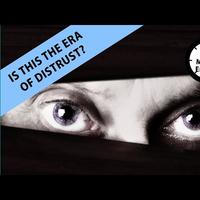Is this the era of distrust? - 6 Minute English - YouTube
Hello. This is 6 Minute English from
BBC Learning English. I'm Neil.
And I'm Rob.
As well as bringing the world to a halt
the coronavirus epidemic has led
to an increase
in misinformation, lies and
conspiracy theories on the internet.
In an era of fake news, where even
a president of the United States is
accused of spreading
misinformation, could it be that we are
living through a crisis in trust?
What is trust? And
who should we place our trust in? - these
are some of the questions
we'll be discussing
in this programme.
And we'll be hearing from a philosopher
who believes the problem
is not about trust itself
but about trustworthiness - the ability
to be trusted as being honest and reliable.
And as always we'll be learning some
related vocabulary along the way.
Of course telling
lies and lacking trustworthiness is
nothing new - just think of
the Trojan Horse used
to trick the ancient Greeks.
More recently, the American financier
Bernie Madoff become infamous
as 'the biggest swindler
in history'. In 2009 he was sentenced
to 150 years in prison for
his part in the Ponzi
scam, but how much did he defraud from
investors? That's my quiz question.
Was it:
a) 6.5 million dollars?, b) 65 million
dollars? or c) 65 billion dollars?
I'll say b) 65 million dollars.
OK, Rob, we'll come back to that later.
Generally speaking, trust can be
described as a judgement
that someone can be believed
and relied upon. When we
trust each other it makes life easier,
quicker and friendlier.
Society can't function without trust - so
does that mean the more trust the better?
Well, not according to philosopher, Onora
O'Neill. Here he is speaking
to David Edmonds,
presenter of the BBC World Service
programme, The Big Idea:
We have another word, which is gullible,
and if you simply place
trust indiscriminately
without making a judgement about
whether the other person or
institution is trustworthy
then just trusting to luck as we say,
is probably not a virtue.
There's a difference between trusting
someone because you have
good reason to believe them
and being gullible - that's easy to deceive
because you trust and believe
people too quickly.
If you don't judge who is trustworthy
and who is not, you are
trusting to luck - simply
believing or hoping that things
will happen for the best.
But being gullible and trusting
to luck is exactly how Bernie Madoff
was able to trick
so many people into giving him their
money. Their biggest mistake
was to trust him indiscriminately
- in a way that does not show care or
judgement, usually with harmful results.
So, if indiscriminately trusting people is
such a bad idea, how do
we avoid it? How can
we tell who is trustworthy and who is not?
Here's BBC World Service's
The Big Idea presenter,
David Edmonds, asking
Onora O'Neill to give some details:
An individual or organisation is
trustworthy is they can
justifiably be trusted. To be
trustworthy they need three ingredients.
First, honesty - people have
to be able to believe
what they're told. Second, competence.
Beyond honesty and
competence there's a third element
to trustworthiness: reliability.
That's the boring one. That's just being
honest and competent each time
so that it's not enough
to be episodically honest and competent
for some of the things
you claim to be able to
do but not others.
Philosopher Onora O'Neill identifies three
ingredients for trustworthiness: honesty,
competence and reliability.
Competence means the ability to do
something well. You would trust
a car mechanic to fix
your broken car engine, but you wouldn't
go to them for dental work -
they're not competent
to remove your tooth like a dentist is.
And you wouldn't trust your dentist to fix
your broken down car, either!
Onora O'Neill
also mentions reliability - being
trustworthy because you behave
well all the time and keep
all the promises you make.
It's the combination of these three - being
honest, competent and
reliable - that makes
someone truly trustworthy.
And not someone like Bernie Madoff,
who would run off with your
money and entire life savings.
All of which brings me to my quiz
question. Do you remember, Rob?
Yep, I do. You asked how much
Bernie Madoff stole from
the American investors he lied
to. And I said b) 65 million dollars.
But in fact it was c) 65 billion dollars - a
lot of money to give
to such an untrustworthy
man!
So we've been discussing whether there
is a crisis of trust and asking
how to know who
is trustworthy - able to be trusted
as honest, competent and reliable.
Placing your trust in someone trustworthy
is very different from being gullible - easy
to trick because you trust
and believe people too quickly.
And it can also be unhelpful to trust
things to luck - simply hope
or believe that everything
will work out for the best.
Both of these problems come about
when people trust indiscriminately -
in an unsystematic
way that does not show care or
judgement, usually with
harmful results - as Bernie Madoff's
victims found out to their cost.
But luckily there are many trustworthy
people around and we
can spot them using three criteria:
honesty, in other words not lying;
competence; and reliability.
Competence means an ability to do
something well, in the correct
and effective way.
And reliability means being honest and
competent, all the time, not
just being honest sometimes
or reliable in some actions but not others.
That's all for 6 Minute English. Bye for now!
Bye bye!

